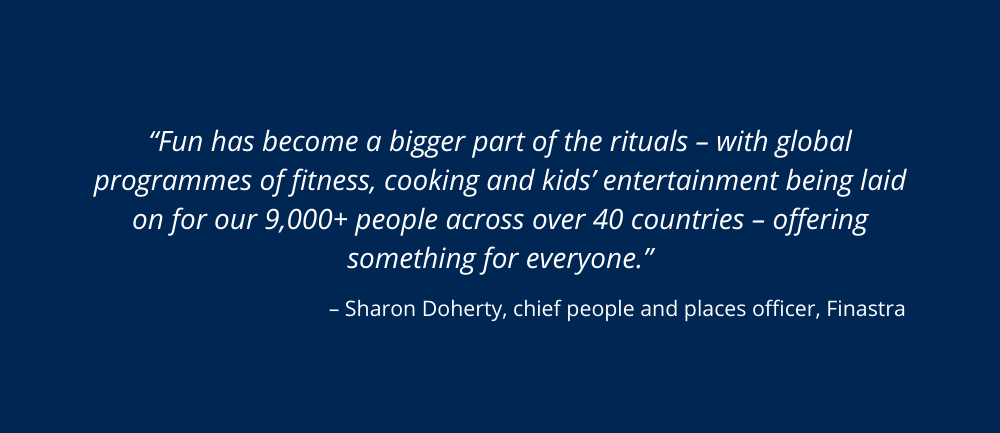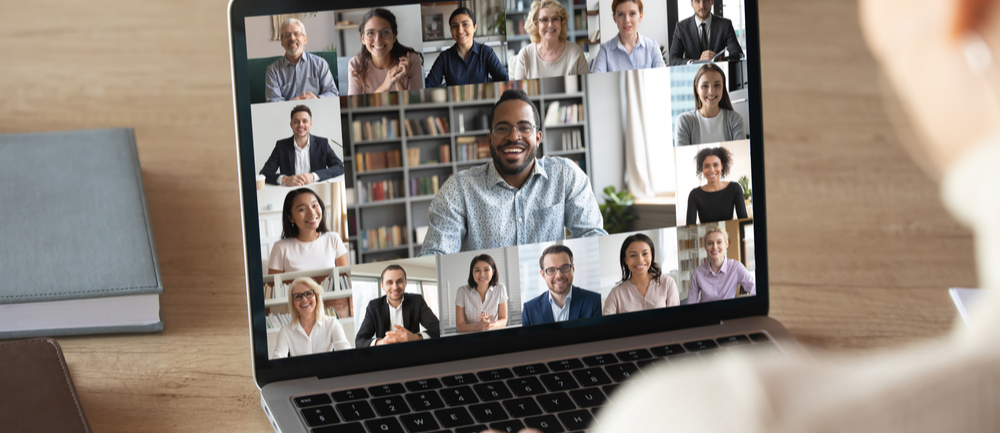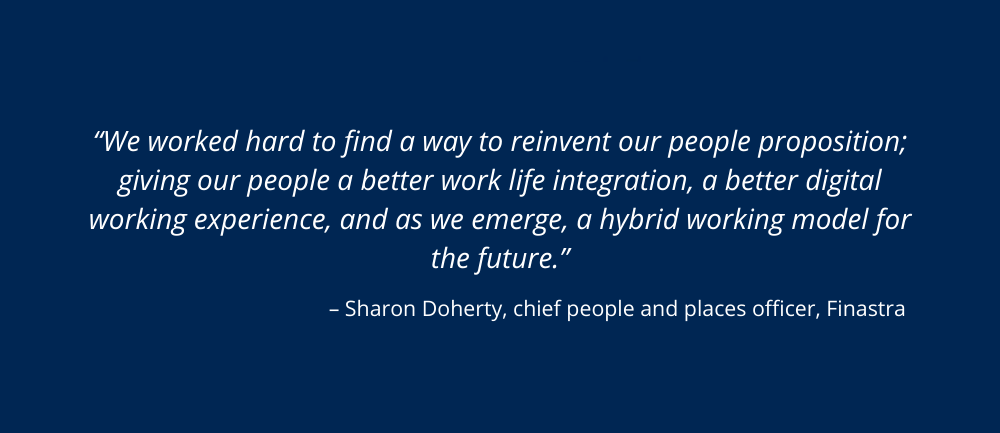-
Provided by

- Date published: Mar 4, 2021
- Categories
As organisations have grown to understand in recent times, employee wellbeing is arguably the number one business priority right now. When the COVID-19 restrictions were first put in place, Finastra’s Open Working programme was developed and rolled out globally to support professionals under pressure, to give employees free choice in how (or even if) they return to the office. The company has pledged to prioritise job preservation and be fully transparent about new measures and initiatives. That said, the mass working from home experiment of the past year has proven that organisations can continue outside of the office. Finastra in particular has seen some very positive outcomes, namely in their engagement scores (monthly eNPS engagement pulse) and comments, and has committed to continue supporting the productivity and wellness of their teams.
In this case study, Sharon Doherty, chief people and places officer, Finastra, outlines how her firm has endeavoured to safeguard employee wellbeing through tumultuous times.
Assessing the challenge
At the outset of the pandemic as our teams moved to remote working, we could see that our people were working longer hours than before. This could have been to do with increased flexibility within working hours, but that didn’t justify the extent of the increase. From the get-go, we declared the wellbeing of our people our number one priority. We were candid that we would prioritise job preservation and be upfront about some of the actions we would take to navigate the initial moment of global uncertainty. We wanted to enable our people to plan where they live and how they manage their families.
To address the problem of burnout, we launched several policies that looked at the benefits of shortening meetings, being culturally aware of days off around the world and focusing time on what is important to our teams.
In the early stages of COVID-19 we communicated very often – this has continued, but the sessions have increasingly become more two-way, as our confidence in using more advanced digital tools has grown. We listen to our organisation weekly, share this communication with people leaders and run ‘You Said, We Did’ campaigns on the big and little things that matter to people – like shipping 4,000 chairs out to our employees to support their home office set up.
Devising a solution
Finastra launched a Digital Balance charter in December, focused on encouraging employees to build digital downtime into their daily routine: a walk with the dog whilst taking a 1-2-1 call or listening into an ‘All Hands’ call, taking a ‘digital detox’, perhaps using a flexible vacation day for a day off any device, and scrutinizing meetings to ensure they are all critical and structured so that staff get what they need out of them.

We trained 1,000 leaders in April 2020 and again from October to March 2021 on how to lead in a new digital reality. We gave them the challenge to create a digital balance with their teams, leading by example and encouraging their teams to do the same – exercising, taking holidays, putting in focus time.
Fun has become a bigger part of the rituals – with global programmes of fitness, cooking and kids’ entertainment being laid on for our 9,000+ people across over 40 countries – offering something for everyone.
Our Employee Resource groups in LGBTQ, gender, special abilities, generation, and multi-cultural inclusion kicked into overdrive. We partner with MIND and support mental health across the different groups. We created space for our US colleagues and allies around the world to talk about and show support for the Black Lives Matter movement.
During this moment we have also done powerful work in our communities. Our company was able to support an initiative in the US called the ‘Cares Act’ providing software that helped deliver financial assistance from the US government to small businesses impacted by the pandemic. The project was hugely motivational for everyone at Finastra, showing how our company can help communities and help to redefine finance for good. Watching how this work brought out the best in our teams was incredibly rewarding.
Harnessing the power of technology
Rather than a single piece of technology, I would say our focus on tech stepped up a gear on our digital first agenda with a focus both on functional and collaboration tools and internal and customer collaboration. We accelerated investment in our functional tools such as Salesforce, Gainsight and Kimble to ensure the team felt like they had access to best of breed tools to do their day jobs – improving productivity and trying to give time back. We also focused on a seamless and end-to-end functional tooling experience, through a rigorous focus on a deeply integrated landscape through Mulesoft.

From a collaboration perspective we nudged people into confidence across our collaboration suite and we all turned our cameras on for more personal virtual connections (pre-COVID some colleagues were camera shy!), and have targeted learning so all employees are sufficient in all tools. We also refreshed our intranet to make it more dynamic and faster for people to find content, news, and support. When it comes to working with customers, we mixed it up by sending selfie videos and using niche tools such as Personify to provide a great customer collaboration experience. Software implementation went 100% remote delivery by building on our existing global delivery infrastructure and operating model.
Ensuring C-suite engagement
Our position as an executive leadership team was pretty clear from April 2020 here at Finastra. COVID brought the future forward, we are built for the future – so we will embrace the learning and opportunities to evolve and improve that are presented. We embraced change and were committed to lead by example.
We worked hard to find a way to reinvent our people proposition, giving our people a better work life integration, a better digital working experience, and as we emerge a hybrid working model for the future.
We used external research – we surveyed our teams and found over 80% want to work from home 2+ days a week and 70% wanted to travel way less. We also could see through our COVID care helpline that bereavement was creating pain and for some people, domestic abuse was becoming worse so we put measures in place to support employees with this. With these insights, plus the courage of our convictions, we launched our OPENWorking program in December 2020, letting our 9,000+ people know what the future of work in Finastra would look like post-COVID, so they could plan for the future where they will live and how they provide child care. In an uncertain world – this clarity was appreciated.
The solution
We’ve seen some very positive impacts of this, in our engagement pulse scores (monthly eNPS engagement pulse), and comments, but it is a journey we will keep on supporting the productivity and wellness of our teams. As part of our belief that everyone needs to take quality time to recharge, we also introduced a new uncapped vacation policy.
We learnt from other successful tech companies such as Netflix and LinkedIn, who have been on journeys to reduce controls and increase trust.

We believe that everyone is more effective without artificial limits on holiday entitlement and encourage teams and employees to take time off as and when they need to – and we have removed approvals in our core HR system, leaving it to an offline approval by managers. So far, this move has been a success as alongside this trust, we have an employee base who are responsible and committed to delivering high standards to our customers, alongside managing their own wellbeing.
We have also implemented Global SAFEleave for victims of domestic abuse and bereavement policies to ensure we can be there for our employees at their times of greatest need.
Hindsight is a wonderful thing. We believe that we did the very best we could for our employees in such a turbulent, uncertain time. The results of our efforts have proven to us that we acted at the right time. We will continue to revisit these new policies and finetune, ensuring we continue to build the optimum workplace of the future.

